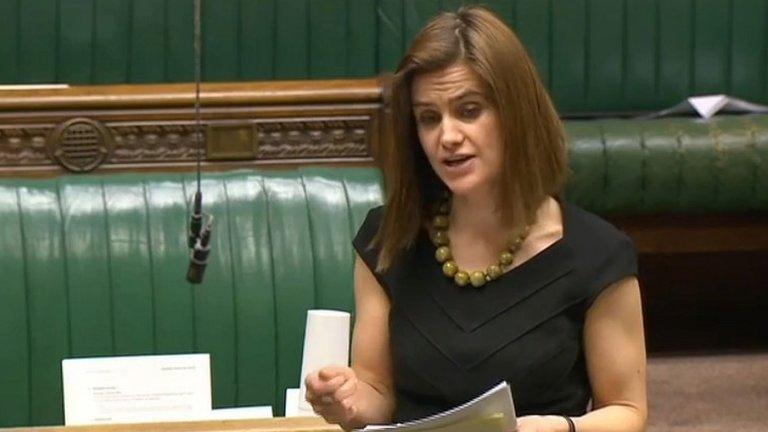Week ahead
- Published
- comments
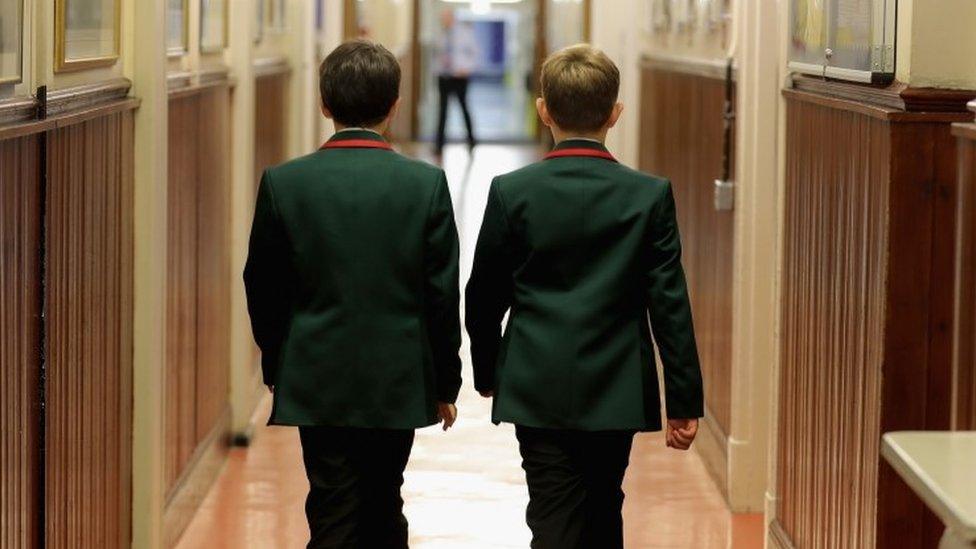
The torch of government has been passed to a new generation of ministers and all kinds of policies are changing.
Next week's political highlight looks likely to be the unveiling of the government's new policy on grammar schools (see Monday) but there will be plenty of other areas in which MPs will want to quiz the new Cabinet team on which previous policies remain operative.
And there will be vast (self) interest in the Commons on the unfolding of one particular previous policy - that of reducing the size of the Commons.
When the Boundary Commission unveils its proposals for the re-drawing of the map of parliamentary seats on Tuesday, it will become clear which MPs will have to fight for their political survival, and with whom. Previously amicable neighbours may suddenly become rivals as their seats are merged or abolished, with an unpredictable impact on party discipline across the House.
Here's my rundown of the week ahead.
Monday
The Commons opens (2.30pm) with Defence questions - probably to be followed by the usual quota of post-weekend statements. Education Secretary Justine Greening has already signalled that she will publish a Green Paper on grammar schools on Monday - and make a statement to MPs.
The main legislation is the report stage and third reading debates on the Wales Bill., external The last two debates on the floor of the Commons on this measure collapsed early, which suggests there is not much controversy around it at the moment - although some sources predict a few sparks will fly when some promised amendments on demarcation issues between England and Wales are presented, when the bill comes before the Lords later in the year.
The adjournment debate is on the Govia Thameslink rail service - another MP for an area hit by the long-running strike action on Southern Trains highlights the problems caused to his constituents; this time it's Crawley's Henry Smith.
In Westminster Hall (4.30pm-7.30pm) MPs debate E-petition 120702, external, relating to South Korea and the dog meat trade - an estimated five million dogs are slaughtered for their meat every year in South Korea.
In the Lords (2.30pm), the first business is the introduction of the first new arrivals from David Cameron's resignation honours list - Baroness Vere of Norbiton, the executive director of the Girls' Schools Association, who also served as Executive Director of Conservatives In, during the EU referendum, and Lord Gadhia - Jitesh Gadhia - lately Senior Managing Director at Blackstone and currently board member of the UK Financial Investments and UK Government Investments.
The day's main legislating is on the Investigatory Powers Bill, external - where peers have reached the sixth and final day of committee stage scrutiny of the bill.
This marks the end of the "shadow-boxing" phase of the debate - expect serious attempts to amend the bill when report stage opens in October.
It is worth remembering that this bill has to be passed by the end of the year, to avoid the legal authority for some existing surveillance powers lapsing. So the government is legislating against the clock, and peers will have some leverage, if they do pass amendments.
There will also be a short debate the qualifications of teachers at academies and free schools led by the Lib Dem, Lord Storey.
Tuesday
The Commons meets at 11.30am for Business, Energy and Industrial Strategy questions, with the new BEIS Secretary Greg Clark probably having to explain where the policy frontiers of his newly reshaped department lie; compared to the old BIS department he has lost higher education, but acquired energy.... and since he has always previously been involved in city devolution, it will be interesting to see whether he will have some continuing stake in the Northern Powerhouse and the creation of city and regional mayors, a process he was in charge of in his previous role as Communities and Local Government Secretary.
That is followed by a Ten Minute Rule Bill to take action against company directors for breaches of the Privacy and Electronic Communications (EC Directive) Regulations 2003 on unsolicited marketing from the SNP's Patricia Gibson.
Then comes the second reading of the Digital Economy Bill, external, which would require all porn websites available in the UK to implement age verification, with a new regulator to oversee the system. It also covers electronic communications infrastructure and services; protection of intellectual property; data-sharing; OFCOM regulation of the BBC and age-related TV licence fee concessions.
The adjournment debate, led by Labour's Andy Slaughter, is on the fire risk from faulty tumble dryers - he will be asking the government and manufacturers to stop the use of faulty tumble dryers after it emerged that a huge tower block blaze in Shepherd's Bush, in his constituency, was caused by a faulty tumble dryer.
The day's Westminster Hall debates are on compensation for victims of Libyan-sponsored IRA terrorism (9.30am-11am) led by the Conservative James Cartlidge. There's a cross-parliament campaign on this issue, which is the subject of a private members bill in the Lords, from the Ulster Unionist, Lord Empey.
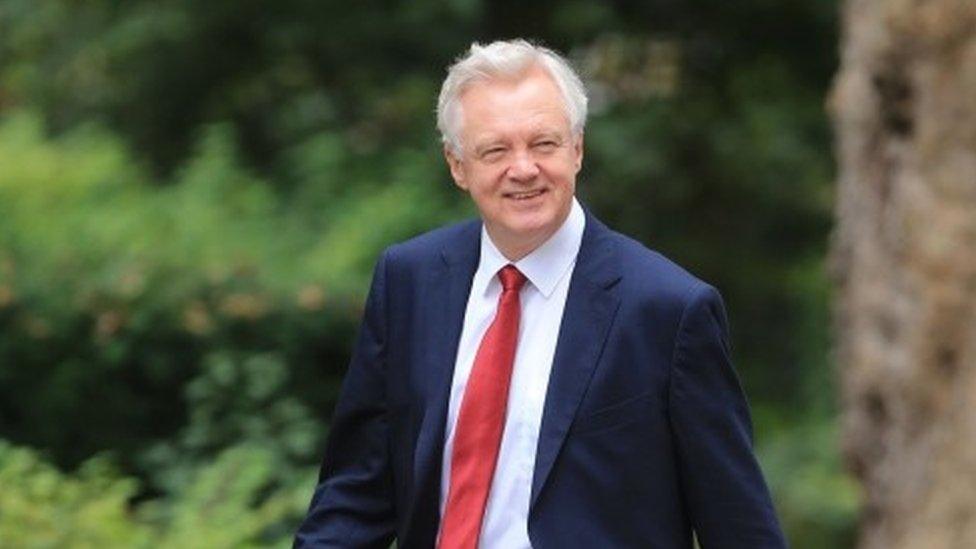
David Davis will be appearing before the Foreign Affairs Committee on Tuesday at 3pm
Other debates include Claire Perry's, on the penalties for causing death by dangerous driving (11am-11.30am): Owen Thompson on consumer protection for online gaming (2.30pm-4pm); Ian C. Lucas on Post Offices in Wales (4pm-4.30pm) and former the Arts Minister, Ed Vaizey, on funding for the arts (4.30pm-5.30pm).
The week's select committee highlight is the debut of the Brexit Secretary, David Davis, before the Foreign Affairs Committee, external (3pm) to talk about the implications of leaving the EU for the UK's role in the world.
Will this turn into a pre-emptive strike by the committee against the creation of a specialist Brexit Committee to oversee Mr Davis and his department?
In the Lords (2.30pm) two more new peers arrive: Baroness Bloomfield of Hinton Waldrist, a Conservative Party fundraiser, and Baroness (Shami) Chakrabarti the former the director of the British civil liberties campaign group Liberty, who was invited by Labour Party leader Jeremy Corbyn to chair an internal inquiry into anti-Semitism in the Labour Party. She will sit as a Labour peer.
Then peers canter through some legislation. First is the third reading of the Cultural Property (Armed Conflicts) Bill and then the annual rubber stamping exercise under which all stages of the Finance Bill, which enacts the measures in the Budget, are approved in a single sitting. (Peers are not allowed to interfere in money measures).
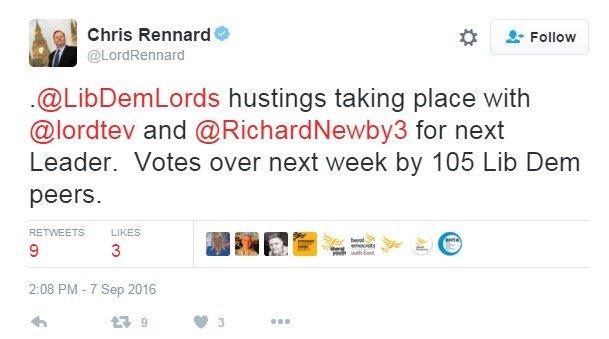
Meanwhile, look out for the election which will determine who is the most powerful Liberal Democrat in Britain; their party may have suffered a near wipe-out at the last election, but the 105 Lib Dem Peers remain a formidable bloc in the Upper House, and today they will decide whether their leader should be their current Chief Whip, Lord Newby, or the ex-MEP Lord Teverson.
The count begins at 3pm, and should not take very long - with just two candidates the traditional Lib Dem delight in proportional election systems will not be indulged....
Wednesday
The Commons opens (11.30am) with International Development questions, followed at noon by Prime Minister's questions.
Then comes a rather intriguing Ten Minute Rule Bill from the Conservative Charlie Elphicke "to implement the withdrawal of the United Kingdom from membership of the European Union". Mr Elphicke, who was reluctantly pro-Remain during the EU referendum, is being rather coy about precisely what this is supposed to achieve, other than to have some discussion of Brexit on the floor of the House. Hmmm.
The day's main debate is on a Labour motion on the NHS sustainability and transformation plans.
In Westminster Hall, the debates include Gavin Robinson's on Social Fund funeral payments (9.30am - 11am); David Hanson's on use of air guns by under 18s (11am -11.30am); Fiona Bruce on the cross-departmental strategy on social justice (2.30pm -4pm); David T. C. Davies on the BBC and political impartiality (4pm-4.30pm) and Ronnie Cowan on the universal basic income (4.30pm-5.30pm).
In the Lords (3pm) the main event is the first of three committee stage days on the Policing and Crime Bill, external - peers will be scrutinising Clauses 1-27 which deal with Emergency Services collaboration; police complaints; police super-complaints; and whistle-blowing. There will also be a short debate on reducing the incidence of smoking-related diseases.
Thursday
The Commons opens (9.30am) with Transport questions - providing a different Thursday slot for the former Leader of the House, now Transport Secretary, Chris Grayling. Then the current Leader, David Lidington will announce what MPs will be talking about when they return from their conference recess, in October.
The main debates, chosen by the Backbench Business Committee, are domestic abuse and the family courts - the motion notes the Women's Aid report entitled Nineteen Child Homicides, external, and calls on the government to review the treatment and experiences of victims of domestic abuse in family law courts. Angela Smith, Jess Phillips, Peter Kyle, Maria Miller and Alison Thewliss are leading.
The second debate is on quantitative easing, led by the SNP's Ian Blackford. The motion calls on the Bank of England to provide a detailed analysis of the effect of its quantitative easing programme on the financial markets and the wider economy, which includes an assessment of future developments in of the quantitative easing programme and other monetary policy measures it may consider appropriate to achieve its objectives.
The adjournment debate is on a key Brexit issue: passporting financial services into EU markets - former shadow Chancellor Chris Leslie leads. He says that, with 12% of economic output from financial services and £60bn of tax revenues, how British firms are able to trade in the EU, post Brexit will be of crucial importance.
"Financial services - including insurance, legal, advisory and not just banking - are now prominent employers in every city across the UK. Treasury Ministers will be pressed for detail on their strategy for maintaining this British world-leading sector after we leave the EU."
In Westminster Hall at 1.30 pm, there's a debate on the Justice Committee's report on Prison Safety, external, and the government response - and it's a fair guess that this may provide an opportunity for Committee members to express their dismay at the shelving of former Justice Secretary Michael Gove's proposed prison reforms.
In the Lords (11am) there are two more new arrivals: Lord McInnes of Kilwinning - a Conservative member of Edinburgh City Council - and Baroness Couttie, formerly Philippa Roe, the Leader of Westminster City Council and chairman of The West End Partnership.
The main debates are on subjects selected by backbench peers: the former Health Secretary, Lord Lansley, on Tackling Drug-Resistant Infections Globally: Final Report and Recommendations; the impact of French government's decision to dismantle the Calais refugee camp on refugee children - Lord Dubs and the effect of conflict in fragile states on the rate of human rights abuses and the number of widows led by Lord Loomba.
After that Parliament is in recess for the party conference season - and MPs and peers will return to Westminster on Monday 10 October.
- Published17 June 2016
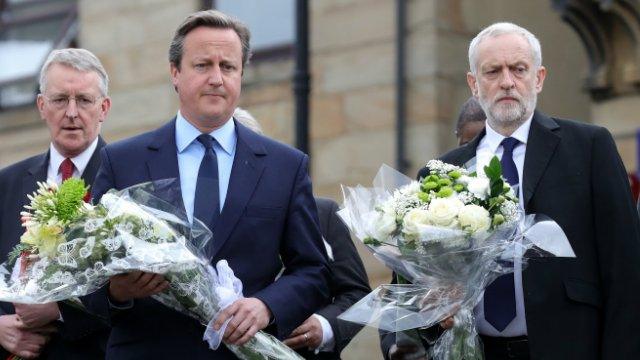
- Published17 June 2016
